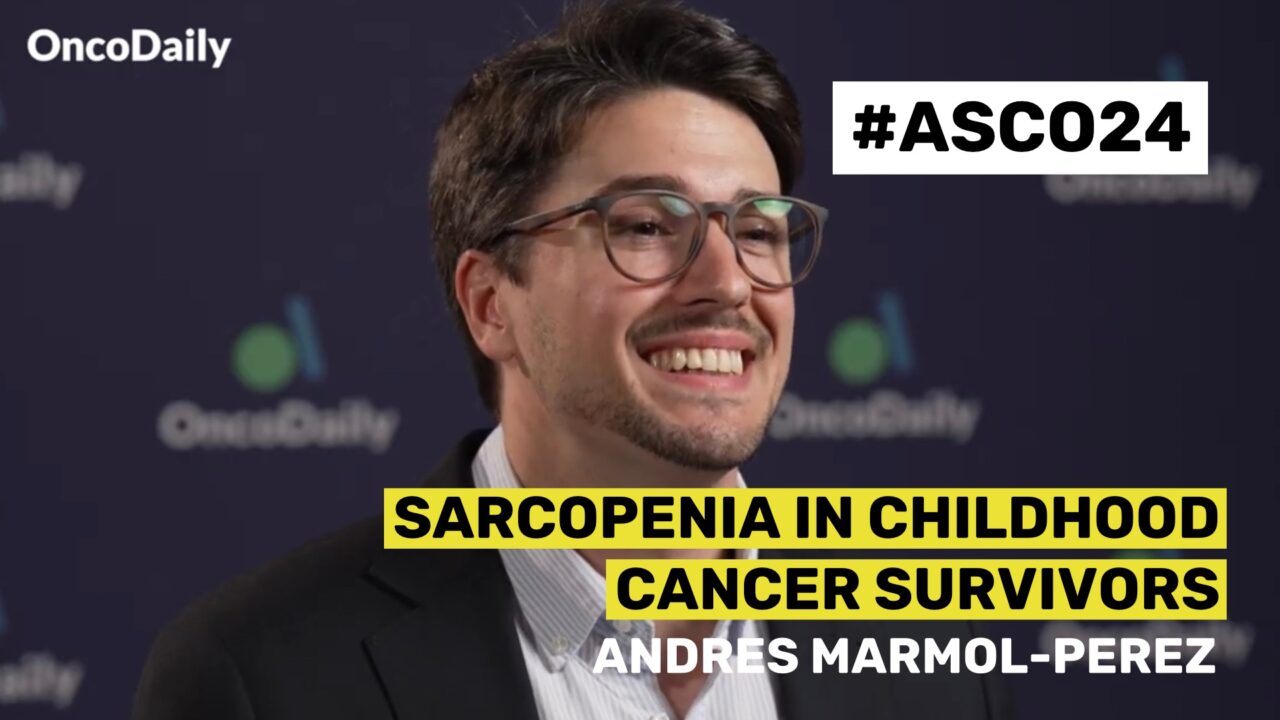
ASCO24 Updates: Andres Marmol-Perez on Sarcopenia in Childhood Cancer Survivors
The American Society of Clinical Oncology (ASCO) Annual Meeting is one of the largest and most prestigious conferences in the field of oncology. This year, the meeting took place from May 31 to June 4 in Chicago, Illinois. The event gathers oncologists, researchers, and healthcare professionals from around the world to discuss the latest advancements in cancer research, treatment, and patient care. Keynote sessions, research presentations, and panel discussions are typically part of the agenda, providing attendees with valuable insights into emerging trends and innovations in oncology.
This year, OncoDaily was at ASCO 2024 for the first time covering the meeting on-site. We had the pleasure of interviewing researchers who summarized the highlights of their work.
In this video, Andres Marmol-Perez, a clinical researcher from the University of Granada, Spain, shared insights on ‘Risk of low bone mineral density in young pediatric cancer survivors with sarcopenia.‘
Hi, my name is Andrés Mármol Pérez, clinical researcher at the University of Granada, Spain, and former researcher at Sanju Children’s Research Hospital. The work that we presented in 2024 ASCO annual meeting was aimed at investigating the risk of global mineral density in survival of childhood cancer with sarcopenia. Sarcopenia phenotype has been investigated in adult survival of childhood cancer and has been found to be prevalent and also associated with the risk of fragile including low mineral density.
In younger survival sarcopenia phenotype have been also investigated, but the muscle strain dimension has not been included in the sarcopenia phenotype. Therefore, we aim to investigate which was the risk of low mineral density in this population who we know that is at risk of sarcopenia. For the purpose of this study, we used the IbonFIT cohort, which is a randomized controlled trial aimed at investigating the osteogenic effect of an exercise intervention on bone health in young childhood cancer survivors.
For the purpose of this specific study, we used the IbonFIT cohort, which is a randomized controlled trial aimed at investigating the effects of an osteogenic exercise intervention on bone health in younger childhood cancer survivors. In total, 116 participants were included from 6 to 18 years old who were exposed to chemotherapy or radiotherapy and were one year after ending the treatment phase. For the sarcopenia phenotype, we follow the European working group consensus on sarcopenia, although we modified the cut-off point for pediatric population.
No sarcopenia was identified as having no muscle strength deficits. Sarcopenia probable was identified as having muscle strength deficits but no low limb mass and sarcopenia confirmed was identified as having muscle strength deficits but also low limb mass. For bone health, we assessed four different regions with DEXA, total body, total hip, lumbar spine and femoral neck.
The results of our study show that sarcopenia was identified in almost 40% of survivors. Interestingly, we also found that this proportion was higher in male than in females. The main findings of our study show that the risk of having low bone mineral density at total body was almost seven fold in those who had sarcopenia compared to those who didn’t have sarcopenia.
In total hip and femoral neck, we found similar results although the risk was lower between three and five fold increased risk of having low mineral density. Therefore, we can conclude although taking into account some limitations that our study is showing that the risk of low mineral density in survivors with sarcopenia is high. In this sense, resistance training, exercise, intervention are recommended right after finishing treatment to improve osteosarcopenia phenotype in this population.
More videos and content from ASCO 2024 on OncoDaily.
-
Challenging the Status Quo in Colorectal Cancer 2024
December 6-8, 2024
-
ESMO 2024 Congress
September 13-17, 2024
-
ASCO Annual Meeting
May 30 - June 4, 2024
-
Yvonne Award 2024
May 31, 2024
-
OncoThon 2024, Online
Feb. 15, 2024
-
Global Summit on War & Cancer 2023, Online
Dec. 14-16, 2023
